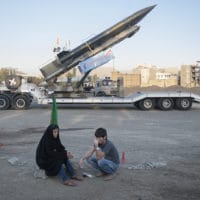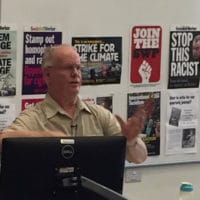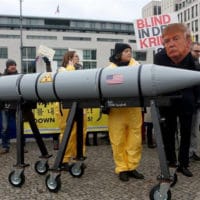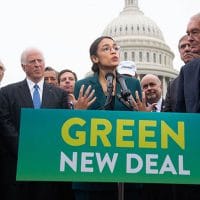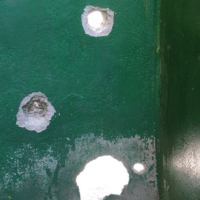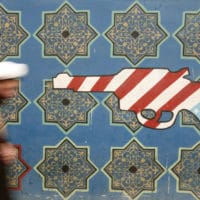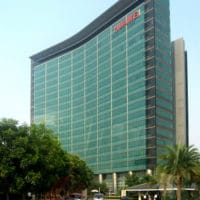-
Why the world is watching the fate of an Iranian tanker in the Mediterranean
The British, it is clear, seized the Iranian tanker at the urging of the United States. There was no previous British warning that it might enter in such a muscular way into the U.S. attempt to suffocate Iran.
-
A Tale of Corruption by the United Auto Workers and the Big Three American Automakers
What follows is a somewhat complex tale of what happens when a labor union, structured to be unaccountable to the rank-and-file membership, embraces a system of labor-management cooperation rather than a class-conscious understanding that workers and their employers are adversaries with fundamentally opposed goals and desires.
-
Warnings ancient and modern
Before the Berlin Wall was torn down we all made sarcastic jokes about its official designation by East German (GDR) party leaders as “anti-fascist protective barrier”. But hearing racist ranting by AfD leaders now hoping for victories and seeing gangs of marching thugs with barely–paraphrased Nazi slogans we must wonder if perhaps that scorned terminology also contained just a bit of truth.
-
Why Kashmir is suddenly a potential global point of conflict
Before India’s Home Minister Amit Shah introduced the Jammu and Kashmir Reorganization Bill in the Indian Parliament, his government sent tens of thousands of Indian troops into Kashmir. There is no official number, but it is often said that there are nearly 600,000 Indian troops in the state. That a population of 12 million people needs this kind of armed action suggests that they are an occupied people.
-
Crisis, which crisis? climate change and capitalism
The essays compiled in this special issue of Key Words address the theme of crisis. But which crisis?
-
The Mexican debt crisis and the World Bank
In 2019, the World Bank (WB) and the IMF will be 75 years old. These two international financial institutions (IFI), founded in 1944, are dominated by the USA and a few allied major powers who work to generalize policies that run counter the interests of the world’s populations.
-
Trump’s ‘diplomacy’ in Iran is a cynical farce
The problem for any negotiations is that the U.S. position is untenable. The U.S. wants to prevent Iran from exercising its right under the Nuclear Non-Proliferation Treaty (1968) to enrich uranium even to low levels. It is this impossible position by Washington that will prevent diplomacy.
-
Homage to OSPAAAL, the organisation of solidarity for the peoples of Asia, Africa, and Latin America
We live world where the aspirations of the workers and peasants are arrogantly dismissed. It is a world where the violence of a B-52 bomber is seen as reasonable, whereas the cries for an end to hunger are seen as utopian.
-
Iran simply won’t let itself be hemmed in by the U.S. and UK
The United States is leading a process to create a naval force that would patrol the Strait of Hormuz. The U.S. has said it will send “command and control” ships to coordinate the escort naval vessels from different countries. But there are cracks in the coalition.
-
The discovery and rediscovery of metabolic rift
Ian Angus discusses the scientific developments that led Marx to develop metabolic rift theory, and a new generation to rediscover it in our time.
-
A fateful tug-of-war
On June 2nd Christian Democrat Walter Lübcke was shot dead in front of his home. Stimulated by fascist blogs, one of them that of a prominent adherent of the Alternative for Germany (AfD), the murderer, a dyed-in-the-wool fascist, had been plotting the attack ever since hearing Lübcke’s fierce reply to vicious anti-foreigner catcalls at a public event four years earlier.
-
The U.S.-Iran standoff can only end when the U.S. accepts Iran’s right to have a nuclear energy program
The U.S. objection to Iran is not based on international law, but merely based on its political objectives. This is clearly illustrated by open U.S. support for nuclear energy and nuclear weapon development in India; and nuclear weapon stockpiling in Israel, which the U.S. has always fully backed.
-
Today’s Struggle for a Green New Deal: Lessons from the Freedom Budget of the 1960s
The potential mass appeal of the Freedom Budget failed to materialize in part because “realistic” compromises were made by its supporters: partisans of the Green New Deal should not make the same mistake.
-
The UK’s dubious role in the new tanker war with Iran
There are signs of a new tanker war in the Persian Gulf, with Britain joining a coalition that wants a war with Iran.
-
The Lasalin massacre and the human rights crisis in Haiti
Based on remarks by Mr Luiz Awazu Pereira da Silva, Deputy General Manager of the BIS, at the Conference of the Central Banks and Supervisors Network for Greening the Financial System (NGFS), Paris, 17 April 2019.
-
Trump murdered the Iran Deal—and Europe isn’t too happy about it
During the July 14, 2019 meeting between France, Germany, and the UK to discuss their response to the U.S. withdrawal from the Iran Nuclear Deal, President Hassan Rouhani remarked that Iran is “always ready for negotiation.” Iran, he said, urges the U.S. to “abandon bullying.”
-
For the reasons that follow, that Country is currently not likely to be the United States
The largest delegation from outside Russia at the St. Petersburg International Economic Forum in early June came from China.
-
Snow queen and Bremen hopes
In late June, some 5000 protestors camped out, as part of the “Stop Air Base Ramstein Campaign,” drawing attention to Germany’s increasing militarization via NATO. They demanded the U.S. Army base at Ramstein—where the top generals direct troop movements in Africa and the Near East, and deploy drones to murder anyone the Pentagon decides is an enemy—be shut down.
-
Why Trump caved to China and Huawei
Everything about the trade war between the United States and China is bewildering. Truces would come out of nowhere but then they would be set aside by U.S. President Donald Trump in a stream of tweets at odd hours. Regardless, Huawei and China are unlikely to blink. They have the upper hand.
-
Should universities care about the truth?
Those with responsibility for the strategic direction of universities have a clear choice in this matter. They can embrace the funding and accolades that come from saying things the Government and other funders want to hear; or they can do what most ordinary people think universities are supposed to do.





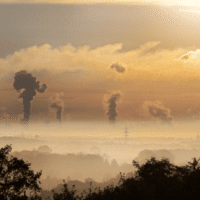
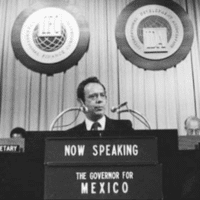

![All-India Democratic Women’s Association protest, led by Subhashini Ali (Politburo Member, Communist Party of India [Marxist]), in Delhi, 30 July 2019.](https://mronline.org/wp-content/uploads/2019/08/All-India-Democratic-Women’s-Association-protest-led-by-Subhashini-Ali-Politburo-Member-Communist-Party-of-India-Marxist-in-Delhi-30-July-2019.-e1565218985602-200x200.jpg)
